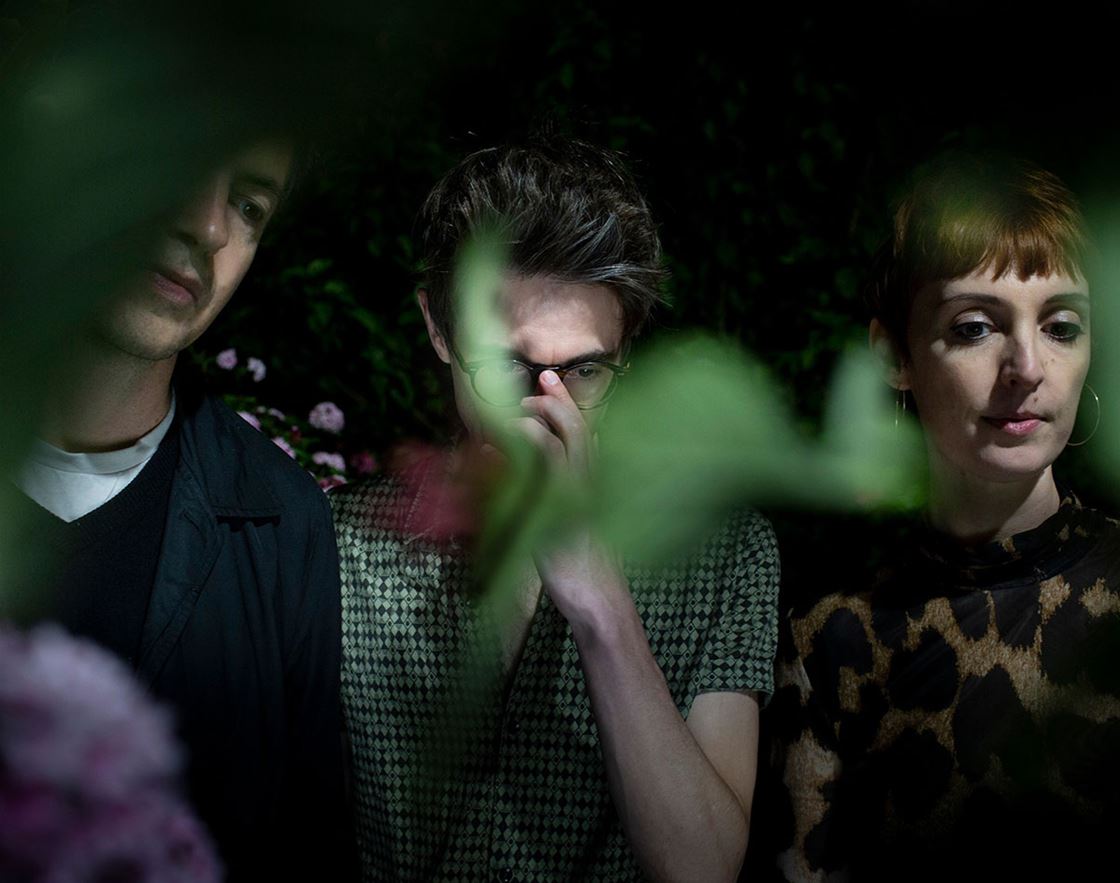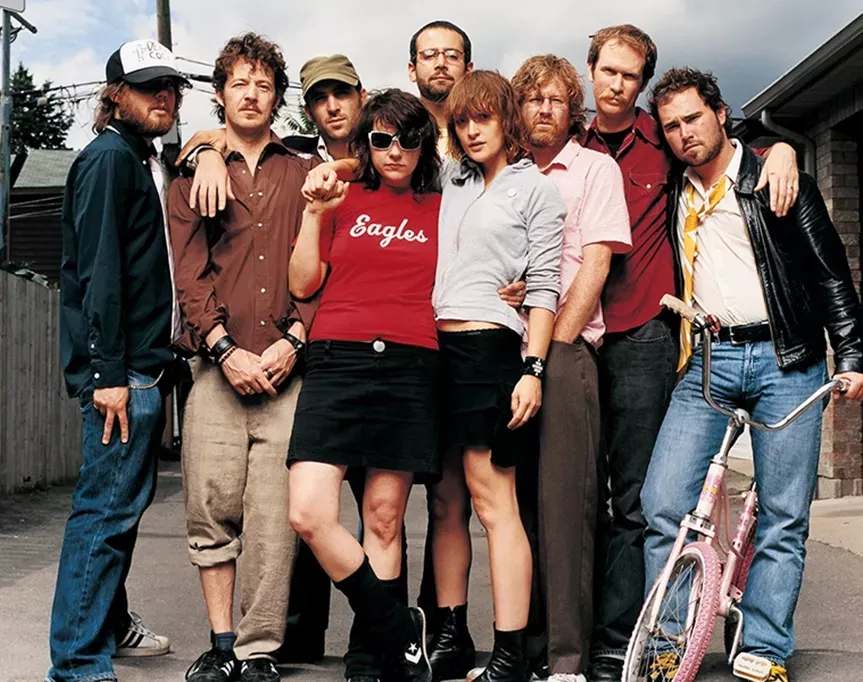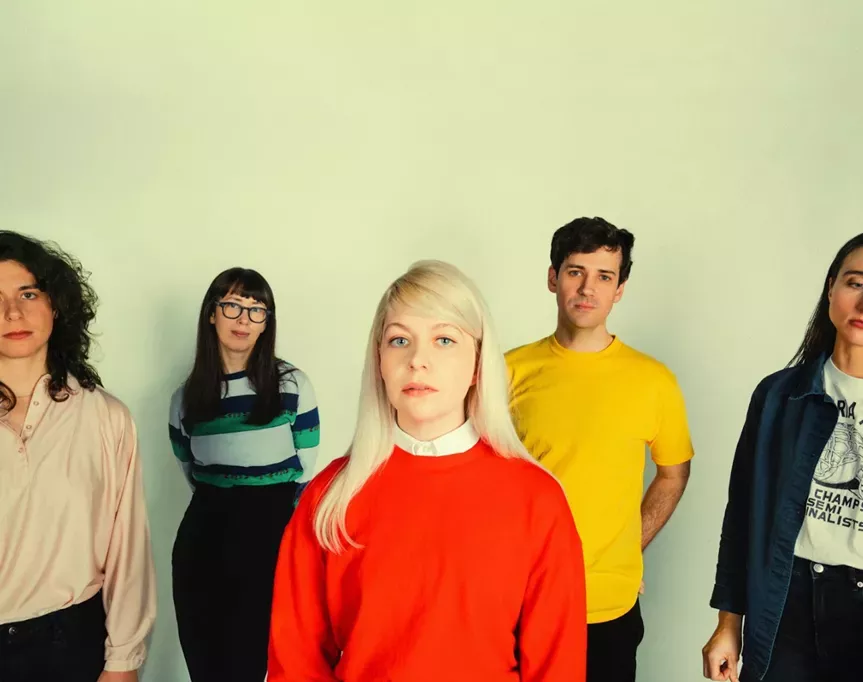tunesday – reality instructors premiere and interview
The Sydney punk trio raced to make their latest EP while guitarist Dan Pash was rapidly losing his hearing.
In the mood to feel the rage? The “aggro-jangle” of Reality Instructors, along with their churning guitars might offer some catharsis for you. We’re pretty chuffed to be premiering the Sydney band’s EP The Timeless Threat of… below, and even more grateful to find out how it came together.
The record was created while guitarist Dan Pash was rapidly (and permanently) losing his hearing due to a genetic condition. By the time the band were recording, Dan relied almost entirely on muscle memory to play guitar, while he sung on his own internal sense of pitch. Dan’s deafness has been painful to confront (he detailed his experience in another interview over here) and effectively spells the end of the band – at least in its current form. Ultimately, he and bandmates Eve Lande and Nick Kennedy have made the most of a difficult situation, growling and thrashing their guitars until the very last minute.
View this post on Instagram
What brought the band together in 2017? Dan Pash: Due to my increasing deafness, I had basically given up on making music as it simply presented too many logistical challenges. Eve’s response was essentially to take up bass guitar from scratch in order for us to begin writing songs in a quiet, no-pressure environment. What started as a bedroom project became a band when Nick Kennedy came along to a rehearsal and decided he liked it enough to stay!
How does a Reality Instructors song usually come together? Dan: Usually one of two ways: either I have an idea I’ve rather obsessively toiled away at for a few days/weeks/months before presenting it to Eve who provides improvements, or Eve has a vague idea of something, which she and I then flesh out together. Then comes the force of Nick Kennedy to turn it into a real true thing. Lyrics are also done collaboratively, with Eve or myself coming to each other when we get stuck (e.g. “What rhymes with ‘emptiness receding’?”).
Dan was losing his hearing rapidly during the making of this EP. What was the recording process like for you? Eve Lande: Liam Judson, our producer, already knew the deal from the first record and had some tricks up his sleeve to make it work, as he always does. Dan needed to be kept away from his amp, but we recorded most of it “live” (sans vocals). Nick and I were in the room with the drums, bass and the two guitar amps, and Dan was in the mixing console booth in the other room.
There was a double set of glass windows in between the two rooms so we could all have an eye on one another. Putting down guitars seemed easy – Dan was either playing from memory or off the mixing console sound, or the bleed through the walls from the other room. Doing the vocals was harder – what Dan was hearing was not what he was singing (just in certain ranges). He therefore had to pitch sharp or flat (to his internal ‘ear’) to hit it perfect and it was a bit of a headfuck, as what he was hearing sounded terrible but what we were hearing sounded great!
What did you love most about the process of making this EP? Dan: From the moment we got together, there was a ‘nothing to lose’ mentality, given that we knew it could end at any moment. That was how we approached rehearsals and live shows, as well as this final recording session, meaning there was a pretty intense camaraderie between us by the end of it. So that was the main highlight. I suppose retrospectively, it would be easy to look back and see the process as imbued with some sadness, but at the time it was utterly joyful.
Dan now has a cochlear implant. Is making music (perhaps in a completely different way) still on the cards? Dan: For me this is a really interesting question in the abstract. At a concrete level, I’m not sure if I could make it work or if I have the desire (or the guts) to try. No doubt there are people with implants making great music, and I’m excited by the possibility, but it would involve a drastic shift in my thinking about how music comes about and how to take pleasure in listening to it. Still, one of the consequences of losing my hearing has been learning to find beauty wherever it appears (and in whatever form), so it wouldn’t make sense to close the door on it completely.
Have you seen the film Sound of Metal? What did you think of it? Dan: I haven’t seen it as the subject matter is still just a little too raw for me. At the same time, I would love for it to result in added attention to the conversation around d/Deafness and music.
Eve: I saw it. I think the film suggested the importance of distinguishing between the two d/Deaf communities (lowercase ‘d’ deaf being, as a generalisation, those who were brought up and mainly operate in the hearing world, like Dan. Upper case ‘D’ refers to the community the protagonist joins in the film, who identify culturally as Deaf and are actively engaged in the Deaf community).
It made me question some of my actions as Dan's partner and bandmate, which I had previously viewed as supportive. For example, I viewed finishing off and releasing this EP after Dan has been able to hear it (we wrote it and recorded it just before he got his implant, but finished it post-implant) as a good way for him to start re-engaging with music. But after seeing the film, I started to wonder. Given that making and releasing music is a hearing person’s privilege for the most part, I queried whether it was necessarily a nice thing for Dan to engage with it, newly implanted, or whether it could have instead been incredibly alienating and nostalgic.
The film suggested to me that maybe it’s important and psychologically healthy to be part of a community that doesn’t see deafness in terms of an absence of something, or something that needs to be “fixed” in some way via implant or otherwise. Dan of course was keen to release the EP, however, and here we are. But the film made me question some of my assumptions.
If you could go back in time, what would you tell your 16-year-old self? Eve: Start a band (I didn't do this until my late 20s!).
Dan: Math-rock isn’t the future. Also, while in your 20s, some people will tell you that facial hair suits you. They are wrong.
What’s your best non-musical skill? Dan: I just finished a PhD at Sydney Uni, and I don’t know if I’m the most skilled at it but I really love tutoring and teaching in philosophy.
Eve: Helping creative people do their thang by doing some of the stuff they don’t wanna do (but need done). I once got a trophy for this.
What’s making you happy right now? Eve: Aki Kaurismäki films.
Dan: Fernando Tatís Jr., a baseball player for the San Diego Padres.
What’s your life philosophy? Dan: A blend of Emersonian perfectionism and Wittgensteinian quietism (i.e. keep moving forward and don’t worry if you are perennially stumped by the big questions).














.jpg&q=80&w=316&c=1&s=1)













.jpg&q=80&w=316&c=1&s=1)










